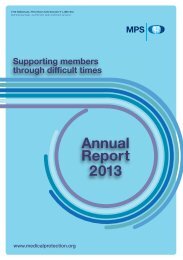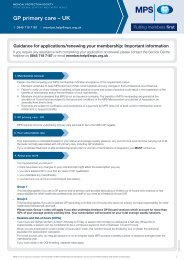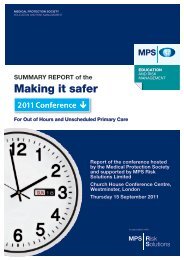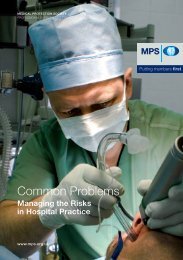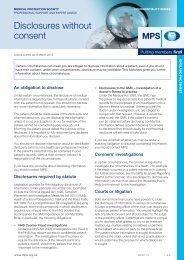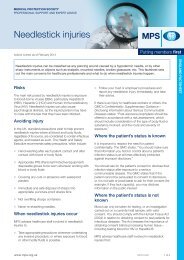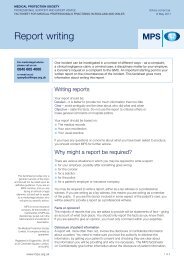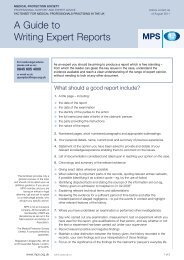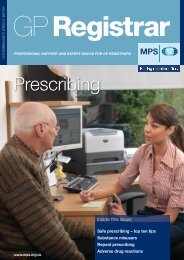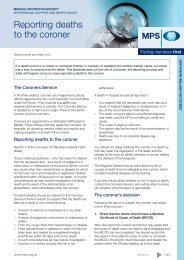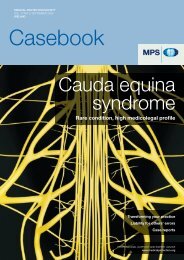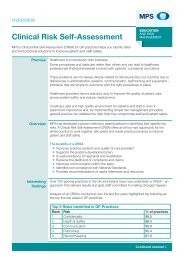Confidentiality – general principles - Medical Protection Society
Confidentiality – general principles - Medical Protection Society
Confidentiality – general principles - Medical Protection Society
Create successful ePaper yourself
Turn your PDF publications into a flip-book with our unique Google optimized e-Paper software.
as the patient’s agent under the DPA, full disclosure in<br />
accordance with the act should normally take place.<br />
However, if you believe the patient may not appreciate<br />
the nature and extent of the disclosure it would be<br />
prudent to confirm their agreement before proceeding.<br />
Where information from the records is being disclosed in<br />
other circumstances, you should make sure the<br />
disclosure is in accordance with the patient’s consent.<br />
DPA disclosures must be vetted for third party<br />
information and harmful information, and this information<br />
should be redacted.<br />
Where a data controller cannot comply with the request<br />
without disclosing information relating to another<br />
individual who can be identified from that information, he<br />
is not obliged to comply with the request unless —<br />
ICO advice states that a competent child has the right to<br />
make their own application for disclosure under the DPA,<br />
and accordingly any application by a parent (or any other<br />
party) at this point, can only be with the child’s consent.<br />
Prior to the child becoming competent, someone with<br />
parental responsibility can exercise the right on the<br />
child’s behalf, as long as it is in the child’s best interests.<br />
You should allow access by competent patients unless:<br />
■■<br />
■■<br />
It is likely to cause serious harm to the patient or<br />
another person<br />
The records refer to another person (excluding<br />
healthcare professionals) who has not given consent<br />
to disclosure.<br />
ENGLAND FACTSHEET<br />
(a) the other individual has consented to the disclosure<br />
of the information to the person making the request, or<br />
(b) it is reasonable in all the circumstances to comply<br />
with the request without the consent of the other<br />
individual.Where the patient refuses to authorise a full<br />
disclosure of information to a third party, that party must<br />
be made aware that information has been withheld at the<br />
patient’s request.<br />
Disclosures in the public interest<br />
In some cases, it is not possible to obtain the patient’s<br />
consent, such as when the patient is not contactable.<br />
Alternatively, the patient may have expressly refused<br />
their consent. If you believe that disclosure is necessary<br />
in the public interest, and that the benefits from<br />
disclosure outweigh the risks from doing so, it may be<br />
justified to disclose the information, even without the<br />
patient’s consent.<br />
Such circumstances usually arise where there is a risk of<br />
death or serious harm to the patient or others. If<br />
possible, you should seek the patient’s consent and/or<br />
inform them of the disclosure before doing so. Examples<br />
of such a situation would include one in which disclosure<br />
of information may help in the prevention, detection or<br />
prosecution of<br />
a serious crime. A competent adult’s wishes should<br />
<strong>general</strong>ly be respected if they refuse to allow disclosure<br />
and no-one else will suffer.<br />
The GMC has produced supplementary guidance on<br />
Disclosing information about serious communicable<br />
diseases. For more information see the MPS factsheet<br />
<strong>Confidentiality</strong> <strong>–</strong> Disclosures Without Consent.<br />
Disclosures involving patients who<br />
are not competent adults<br />
Children and young people under 18 years<br />
The Information Commissioner’s Office (ICO) is<br />
responsible for governing data protection compliance.<br />
If a young person is able to understand the implications<br />
of the disclosure, they are able to give their consent,<br />
regardless of age. Once children have the capacity to<br />
make decisions about their own treatment, they are also<br />
entitled to decide whether personal information may be<br />
passed on.<br />
Patients lacking capacity<br />
Under the Mental Capacity Act 2005, adults are<br />
assumed to have capacity unless they have an<br />
impairment affecting their mind (eg, dementia), which<br />
means they are unable to make a specific decision at a<br />
particular time. There is also a requirement to ensure all<br />
practical steps have been taken to help the individual<br />
make a decision.<br />
If a patient lacks capacity, you should act in their best<br />
interests when deciding whether to disclose the<br />
information. You must consider the views of anyone the<br />
patient asks you to consult, or who has legal authority to<br />
make a decision on their behalf, or has been appointed<br />
to represent them.<br />
After a patient has died<br />
Your duty of confidentiality to your patient remains after<br />
death. In some situations, such as a complaint arising<br />
after a patient’s death, you should discuss relevant<br />
information with the family, especially if the patient was a<br />
child. If you reasonably believe that the patient wished<br />
that specific information should remain confidential after<br />
their death, or if the patient has asked, you should<br />
usually respect that wish.<br />
The “personal representative” of the patient (usually an<br />
executor of the will, or an administrator if there is no will)<br />
can apply for access to the relevant part of a patient’s<br />
medical records (excepting harmful or third party<br />
information), as can someone who has a claim arising<br />
out of the patient’s death (eg, for a life assurance claim),<br />
or a claim in negligence.<br />
In respect of disclosure potentially associated with<br />
assisted suicide (eg, to Dignitas), specific advise should<br />
be sought from MPS prior to disclosure.<br />
www.mps.org.uk Image © Günay Mutlu / iStockphoto.com MPS0713: 2 of 3



